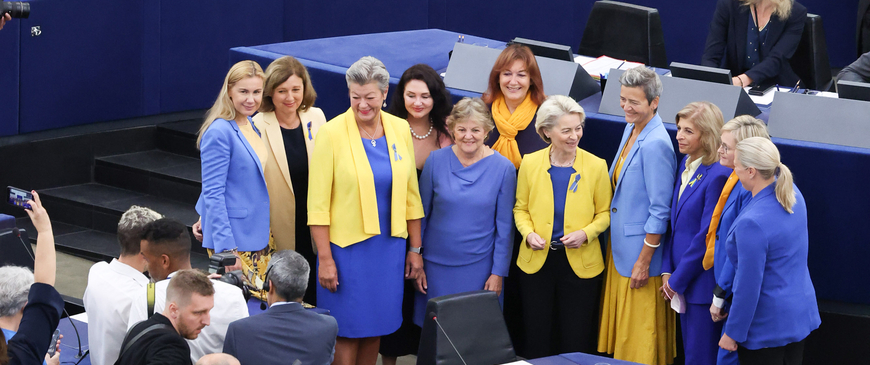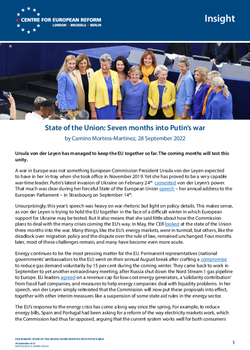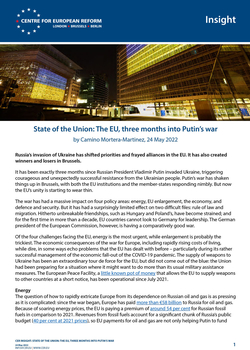
State of the Union: Seven months into Putin's war
Ursula von der Leyen has managed to keep the EU together so far. The coming months will test this unity.
A war in Europe was not something European Commission President Ursula von der Leyen expected to have in her in-tray when she took office in November 2019. Yet she has proved to be a very capable war-time leader. Putin’s latest invasion of Ukraine on February 24th cemented von der Leyen’s power. That much was clear during her forceful State of the European Union speech – her annual address to the European Parliament – in Strasbourg on September 14th.
Unsurprisingly, this year’s speech was heavy on war rhetoric but light on policy details. This makes sense, as von der Leyen is trying to hold the EU together in the face of a difficult winter in which European support for Ukraine may be tested. But it also means that she said little about how the Commission plans to deal with the many crises coming the EU’s way. In May, the CER looked at the state of the Union three months into the war. Many things, like the EU’s energy markets, were in turmoil, but others, like the deadlock over migration policy and the dispute over the rule of law, remained unchanged. Four months later, most of these challenges remain, and many have become even more acute.
Energy continues to be the most pressing matter for the EU. Permanent representatives (national governments’ ambassadors to the EU) went on their annual August break after crafting a compromise to reduce gas demand voluntarily by 15 per cent during the coming winter. They came back to work in September to yet another extraordinary meeting, after Russia shut down the Nord Stream 1 gas pipeline to Europe. EU leaders agreed on a revenue cap for low-cost energy generators, a ‘solidarity contribution’ from fossil fuel companies, and measures to help energy companies deal with liquidity problems. In her speech, von der Leyen simply reiterated that the Commission will now put these proposals into effect, together with other interim measures like a suspension of some state aid rules in the energy sector.
Energy continues to be the most pressing matter for the EU and its response has come a long way since the spring. But differences persist and will increase as winter looms.
The EU’s response to the energy crisis has come a long way since the spring. For example, to reduce energy bills, Spain and Portugal had been asking for a reform of the way electricity markets work, which the Commission had thus far opposed, arguing that the current system works well for both consumers and energy companies in normal times. In her speech, however, von der Leyen said that the Commission will “do a deep and comprehensive reform of the electricity market” – although she did not explain how. In turn, national governments like Spain or France, which had been reluctant to tell their citizens to save energy and had opted to subsidise their energy consumption instead, have changed their tune and signed up to the Commission’s suggested 15 per cent gas demand cut. EU governments and the Commission are still struggling to come up with ways to fix Europe’s energy crisis, but at least they all now agree that the situation cannot be solved just by giving money away, and that reducing demand for both gas and electricity is important to lower prices. Differences in member-states’ usage patterns and willingness to intervene in the markets, however, will make more substantial reform harder in the short term.
EU capitals and the EU institutions are also much more alarmed about the rising cost of living than they were in the spring, and rightly so. Although inflation was already at a historic high in April at an average of 8.1 per cent for the EU-27, national governments were hopeful that inflation could be contained in the short term. Four months later, with average prices in the EU 10.1 per cent higher than they were a year ago and many European citizens worried about their dwindling purchasing power, no-one now believes inflation is temporary. On September 8th, the European Central Bank (ECB) raised interest rates by an unprecedented 0.75 percentage points, in an attempt to rein in inflation. Further increases are likely. But the cost of living crisis is no longer the ECB’s problem alone. And yet, von der Leyen did not outline her plans for the EU’s war economy during her speech. Whether she does not have any plans, or she does not want to discuss them, her silence is unfortunate ahead of what is shaping to be a tough winter for European citizens.
EU enlargement continues to be an important strategic issue but has lost some of the political momentum it had three months ago, when the EU granted Ukraine candidate status in record time. Emmanuel Macron’s idea of a ‘European Political Community’ (EPC) that would bring together like-minded EU and non-EU countries has gathered support and its members are meeting for the first time in Prague on October 6th. Nobody really knows what the EPC will become, or whether it will survive its first meeting – much will depend on the interests of forthcoming presidencies of the Council of Ministers. Czechia, the current incumbent, is particularly keen on shaping the EPC as an antechamber to membership of the EU, as well as a forum to talk about energy and defence with partners who either do not want to become members, like the UK, or will not do so in the near future, like Turkey. Other EU capitals, including Amsterdam, Stockholm and Madrid (both of which will hold the presidency during 2023) may be less enthusiastic. Paris itself is sceptical about enlargement.
EU enlargement continues to be an important strategic issue but has lost some political momentum. The European Political Community is still a vague idea that may end up disappointing candidate countries.
Treaty change is also on the backburner: while the Commission and the Parliament have both called for a convention to reform the treaties in order to give more powers to the EU in some areas like health, and overcome vetoes in others, like foreign policy, most member-states oppose it. One of the issues officials mention is that some of the governments open to treaty reform (like Poland’s Law and Justice and Italy’s likely new prime minister, Giorgia Meloni) may be looking to give fewer, not more powers for the EU. Re-opening the treaties now would trigger existential quarrels about the direction of the European project. More pro-European capitals and the EU institutions know that the bloc cannot risk having that conversation in the middle of a war – but also cannot consider accepting more members into the union without changing some rules. That is why EU governments are more open to surgical reforms that do not need treaty change, such as scrapping decision-making by unanimity on foreign and security policy (since a shift to qualified majority voting in that area is already foreseen in the EU treaties). In any case, the EU is unlikely to advance much on either enlargement or treaty reform unless, or until, it solves its energy and economic woes.
One reason for hesitation about further EU enlargement is the experience of democratic backsliding in some of the member-states that joined the EU in 2004 and later, and the EU’s difficulty in addressing the problem. Conflicts with Poland and Hungary over the rule of law continue. While the Commission has approved Poland's national recovery plan, it has made disbursement of funding conditional on Warsaw reversing its controversial judicial reform. Polish president Andrzej Duda’s plan to comply with the Commission’s request is mostly cosmetic and does not solve one of the EU’s most serious concerns: that the lack of judicial independence in Poland affects the entirety of the bloc’s single market. In August, European judges brought an unprecedented challenge against the Council’s decision to approve Poland’s recovery fund. Their argument is that, by allowing Poland to receive funds without having complied with the conditions set by EU laws, both the European Commission and the Council are failing to preserve effective judicial protection in Poland and damaging the EU’s common legal space. Because European courts cannot trust the Polish judiciary, their co-operation on everything from civil, to commercial to criminal law is thwarted. This, the judges argue, has stopped being a problem only for Polish courts and has now become a problem for the whole EU.
While Poland may be the EU’s most dangerous rule of law offender, Hungary is the loudest. On September 18th, the Commission asked the Council to freeze 65 per cent of Hungary’s cohesion funds (around €7.5 billion) because of breaches of the rule of law. This comes on top of the €5.9 billion of recovery fund money that the Commission has still not agreed to send to Budapest. Viktor Orbánhas said he will pass several laws to ensure that Hungary complies with the EU´s anti-corruption requirements to release cohesion funds. But while these are likely to get a pass from the European Commission, they will not solve the underlying problem: as the Commission´s own assessment makes clear, corruption in Hungary is now systemic and will not be fixed by a few mostly minor tweaks to the law.
The Commission has a difficult job here: Orbán has shown that he is willing to use his veto power in unrelated areas as leverage to extract money from the EU, even at the risk of undermining the EU´s response to the Russian invasion, which is Brussels’ utmost priority. There is no way to expel a country from the EU. Article 7 procedures against Hungary – a sort of disciplinary action to penalise member-states that breach EU values, which could, eventually, suspend Hungary´s voting rights in the Council of Ministers – are stuck because of Warsaw’s support for Budapest. Instead, the EU-26, tired of Orbán’s antics, are looking at other ways to freeze him out, like using the so-called passerelle clauses – a mechanism that allows the Council to switch from unanimity to qualified majority voting in some policy areas. The problem for the EU is that triggering passerelle clauses also requires unanimity. So far, then, these talks have been more of a message to Budapest than a real solution to the question of what to do with Viktor.
Russia’s continuing attack on Ukraine is complicating EU efforts to make progress on energy, enlargement and the rule of law, as well as leading the EU to neglect other important dossiers like climate change and migration. Von der Leyen is emerging as a formidable war-time leader, spear-heading the EU’s support for Ukraine. During the early stages of the invasion, she kept the EU together and pushed member-states to take difficult decisions. For a short time, it looked as if the long-running East-West divide in the EU had faded. But differences are starting to re-emerge. Member-states further away from Russia and lacking the historical memory of Russian domination that Central and Eastern Europeans are starting to fear a growing domestic backlash against the EU’s response to the war. Some capitals are very worried about a looming recession. Support for military assistance to Ukraine is not equally high in all EU countries: the German government is struggling to agree on delivering tanks to Kyiv because of splits within Chancellor Olaf Scholz’s SPD party. Seven months after the invasion, there is still a lot of work to do in bringing all parts of Europe together.
By trying to build a bridge towards Central and Eastern European countries, von der Leyen has unconsciously alienated some capitals for whom unconditional support of Ukraine is not a knee-jerk reflex and for whom treaty reform and enlargement may be anathema. Some member-states and the European Parliament believe that the Commission is being too lenient with Poland and Hungary’s rule of law breaches on account of the war. Others have problems explaining to their citizens what winning the war means and what continued fighting it may imply. Neither Macron nor Scholz is particularly trusted in Central and Eastern Europe – and nor do they seem to be making much of an effort to change that.
It is not easy to have long-term strategies in the middle of a crisis. But if they want to keep Europe together in the face of a new, more intense phase of the war and a hard winter ahead, EU leaders (including von der Leyen) need, at least, to figure out what the end goal of their short-term plans is. Cutting energy demand across the bloc, for example, will help not only with securing supply through this winter, and, crucially, the next, but also to bring down inflation – as soaring energy prices are the main driver of inflation. Governments and the EU would do well to explain to citizens that, while the objective of the next few months should be energy savings, in the medium term, Europeans should work towards energy efficiency. This will be good for Europe’s security and the often-forgotten environment.
Cutting energy demand across the bloc will help not only with securing supply through this winter, and, crucially, the next, but also to bring down inflation – as soaring energy prices are the main driver of inflation.
In taking on the mantle of a war-time leader, von der Leyen has created many expectations, but she may find it difficult to manage them. It is in the interest of EU leaders to help her flesh out ambitious but workable policies to deal with the energy crisis, take forward enlargement and strengthen rule of law in the EU. It is also in the interest of the EU as a whole that von der Leyen and national leaders show a united front on these issues and on their support for Ukraine. An irresolute and divided EU would hand an unnecessary victory to Vladimir Putin.
Camino Mortera-Martinez is head of the Brussels office at the Centre for European Reform.



Add new comment